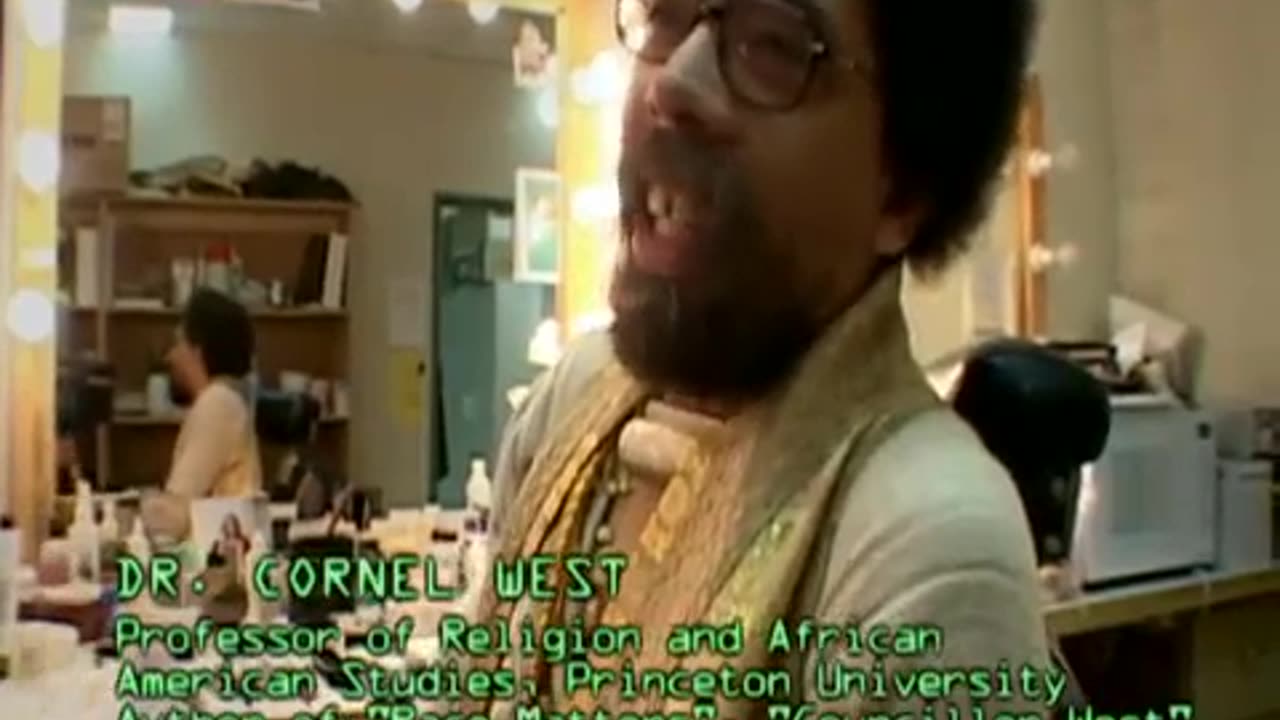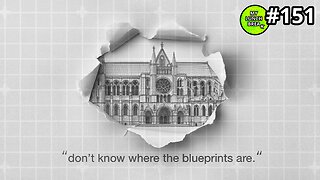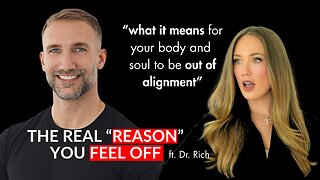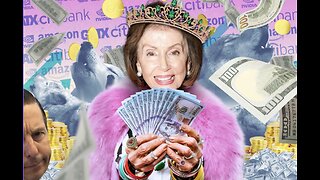Premium Only Content

Return to the Source – Philosophy and the Matrix (2004)
https://www.youtube.com/watch?v=dABJJpEQBAc
This documentary goes over many philosophical concepts that inspired, and are presented in, the trilogy. They spend the first half on the original film, and the rest of the time then goes over parts 2 and 3, with a couple of things on the Animatrix shorts.
It consists of clips of aforementioned releases and interviews. It does a good job of informing the audience about the various thoughts, although it would obviously take far longer to go over all the symbolism in them, and one can ask the very appropriate question if something anywhere near that definite and final is even desired, by viewers or the Wachowskis alike.
That does mean that this is limited, but it is likely enough to enlighten and provide food for thought. In line with the series, this may provoke debate, rather than give answers set in stone. Whether one cares for this or not may depend on the extent of their knowledge on the subject, the old ideas, as well as how much they've thought about the presence of such in these three silver screen efforts.
Obviously, it also makes a difference if one particularly wants to think about the meanings one could possibly take out of them.
TEXT:
Have you ever had a dream, Neo, that you were so sure was real?
What if you were unable to wake from that dream? How would you know the difference between the dream world and
the real world? Philosophy always needs examples. It
needs illustrations. And the more lively and juicy those illustrations are, the
more effectively you can get points across. Only try to realize the truth.
What truth? There is no spoon. Philosophy is a very abstract subject
and it doesn't lend itself very easily to dramatic or fictional, least of all
film presentation. So, it's interesting when a a film succeeds in in doing it.
It's very rare that you can find a movie that engages you in that and is damned
entertaining at the same time. It's this sprawling, brawling, wonderful action adventure that works on that
level so completely. What was startling to me was that the
Wowski brothers managed to cram so much that was philosophically interesting into one featurelength movie. Wowsky
brothers are very very uh concerned about piercing through the macity,
piercing through the superficiality not just of America but of the of our own
modern and postmodern society and culture. The philosophical issues in the matrix
slaps you in the face. And don't worry about the vase or
that vase. They're able to pose and set certain philosophical problems to a very broad
audience. What's really going to bake your noodle later on is would you still have broken
it if I hadn't said anything? They've updated classic philosophical analogies
like uh Plato's allegory of the cave and Deart's story of the evil deceiver in
ways that actually interest people. Each character and each symbol is also
sort of a hypertext of metaphor of illusion in philosophy in math or
science, physics, biology, in computer language and in religion. It's a story
of enlightenment. A way of looking at the world, a way of being in the world, a way of treating other people, a way of
relating to authorities, a way of relating to underlings. God damn it, Morpheus. Not everyone
believes what you believe. My beliefs do not require them to. It's like this big thought experiment
that helps us to think about things that are going to be really important in the future. Looking at the Matrix world as
it's depicted in the movies, I think leads one to this radical revisionary metaphysics of how things could be.
It's not just about making a movie. It is about also deep message. It's a very prophetic message, very progressive
message and still entertaining, amusing, unsettling, soothing, all the things
that great art ought to be.
You're here because you know something. What you know, you can't explain, but you feel it.
You felt it your entire life. I'm somebody who believes in truth. And
I think that sort of everybody does in a certain sense. If you define truth loosely enough uh and and broadly enough
as the truth is whatever is really the case. Once you have that, you're left with a problem of method. How are you
going to discover what is really the case? One method traditionally is something like revelation where God
somehow tells human beings what the truth is and so it just gives you the answer. But then there's another method
that arises around science and philosophy which is the method that philosophers typically call critical
reason. And the idea there is that human beings are going to figure out the truth
for themselves. This isn't real. What is real? You still have to go out and do science. You still
have to go out and do morals. You still have to go out and do art. Philosophy was always the coordinator of these. Philosophy always tried to stand back
and say, "This is how they all fit together." And this is driven out of a sense of wonder about why am I here and what's going on? The really fundamental
deep questions that human beings ask. A lot of people know more philosophy than they realize because philosophy is
basically all around them. It's in the um the culture that they they live and breathe. I can't imagine anybody not
being interested in philosophy because the questions are so fantastic. How do we know what we know? Or how can we be sure that what we think we know, we do
know? How do I know that the world as it appears to me in my experience is
anything like the world as it is in itself beyond my experience? Human consciousness. What is this thing? Our subjective experience of the mind
and the world. Why do we have it? How is the mind related to the body? Do we have free will? What is causation?
What's a law of nature? Why something is right or something is wrong? The radical inongruity and mystery at
the center of things at the mystery of what is. what it means for God to be outside of time. What it means for God
to be qualitatively other than anything we experience. Our relationship between ourselves and
our behavior and the way our environment shapes or influences us. What can I know? What should I do? And
what may I hope or put differently perhaps what is real? I'd rather spend my time thinking about
that than boiling up colored liquids in a test tube which I don't understand anyway. You know the question just as I
did. What is the matrix? The answer is out there. Neo, philosophy
can go deeply into ideas, but unless those ideas grab people at some level,
then you're going to talk past them. In philosophy, we use a lot of things that are called thought experiments
where we suppose these sort of hypothetical cases and then ask what what do you think given this
hypothetical? In science fiction, the these are like really wellw worked out
thought experiments. Sometimes people say the basic question in science fiction is what if? You're doing some sort of thought experiment is
another way of putting it. I'm saying what if I change the parameters of the world thus and so. Whenever Philip Dick
was was talking about an altered reality or reality wasn't what it seemed. I mean
on the one hand uh he was questioning reality but he was also talking about a political reality. He was talking
metaphorically about a lot of the things that are discussed in the Matrix. To some extent, that led to the
beginning of the cyberpunk movement in science fiction where we're trying to write literary science fiction. We're
not the first people to have tried to do that, but we were the best. Cyberpunk. It's about uh the street having its own
uses for high technology, people appropriating and altering technology um for their own
purposes for uh to get ahead kind of get around the system or to for subversion.
The theme of cyberpunk is people turning into machines and machines turning into people. there are these holes in lacuni
and you know these faults and flaws and that the that the technologies rot and that there are sort of technical
failures and that the PR gloss that's put out by the establishment is not
really reality at all and you know if you back off a few steps you can sort of see you know a larger picture which is
you know not particularly flattering
Free your mind.
I'm a sci-fi geek and a fantasy geek and a comic book geek and all of those
things uh were present in the original Matrix. And so I immediately, I think, had the same reaction as geeks all over
America. This is the ultimate geek movie. It's like watching, I don't know, the
blooming of the rare Sumatran fungus or something to see guys who are like genuinely hip instead of very
counterculturally aware having just a massive blowout the door style popular
success.
I am not as much a fan of action films as some other people. So the first time
I saw The Matrix, I was overwhelmed by it, overwhelmed by the imagery and the ideas and didn't have a very clear
coherent sense of how one should understand it. For the first time, I was so wowed by all of the effects that it it took a
second viewing to actually start to think more clearly about all of the philosophical ideas that you could find
in it. The philosophical aspects I think weren't obvious to people at the beginning. I thought when I watched it
since I was a philosopher I could see what they were but it took a bit of work to see the philosophical especially as
the film progressed and after a while people started to talk about those philosophical themes and then it became a subject of philosophical discussion.
I have these memories for my life. None of them happened.
What does that mean? The matrix cannot tell you who you are. But an oracle can.
That's different. Film in some way articulates the modern myths that a culture finds relevant.
This is a very savvy modern myth. One of the dominant metaphors that runs
through a lot of stories in literature uh and myths and religion is that we're all on a journey or some kind of a quest
in life. We're trying to go from one stage to the next and figure out how to behave ethically on that journey. And
the myths are just a great storehouse of knowledge about that and techniques and
ways to survive on the road of life so to speak. What we have in the Matrix trilogy is jazz mythology. You don't
have a single rigid scheme. In the mythological content of the Matrix films, the WVskis are introducing little
elements of mythology here and there, sticking them together, which is a very rich textured way of making a film.
Jesus Christ, he's fast. You're my savior, man. My own personal
Jesus Christ. You scared the big Jesus out of me. Hope the oracle gave you some good news.
In the first Matrix film, the mythological drive is clearly based around Jesus of Nazareth.
You are the one new. It's all about prophecy and expectation of the one, which from a Christian
perspective, that's what the Hebrew Bible is about. thoughts about expectation and prophecy of a messiah.
Thomas Anderson. Anderson sounds a lot like Andros, Greek for man, which provides us with the
phrase son of man. He dies and is resurrected. He can do miracles. So, it seemed like very overt Christian
imagery. When I began to think about what kind of Christianity that was, it became clear to me that it wasn't just
traditional Christianity, but it was Gnostic Christianity. Nazi Christianity flourished in the early centuries of the
first millennium and it was a fierce competitor with traditional Christianity as we would understand it today.
Gnosticism frames the fundamental human problem in terms of ignorance. The solution being
enlightenment whereas traditional Christianity orthodox Christianity um tends to frame the problem in terms of
sin and repentance. This is where the parallel to the matrix becomes so interesting. Nasticism would hold that
the fundamental human problem is that we are diamonds in the mud. We are a soul or a spirit that's trapped in a material
body and we need to get out because we are divine sparks and we don't belong here. There's a term in Buddhism called
samsura and this has to do with the way we ordinarily perceive our world. The
matrix which is a web of illusions in which people are inshed or trapped is
napped parallel with the Buddhist notion of samsara. Ignorance is the problem within the matrix and within Buddhism
and the solution is awakening which is achieved through knowledge.
They're not forms of belief. You have to believe this and you're saved. They're forms of liberation or awakening. If you
do these certain kinds of practice and consciousness, you can awaken to this light or this interior reality or this
ultimate spirit. In a certain sense, you're living in a dream world until you wake up to that reality.
The Matrix is a computerenerated dream world built to keep us under control
in order to change a human being into this.
The point of the matrix probably is to raise questions about our world. It's to make us think about our own world in
slightly different ways and maybe to make us ask questions about what the the real limits and bounds on our own
behavior are. You know, you see the the scene at the end of the first movie where everyone's moving around in a sort
of trancelike way and Neo seems to be the only one that in that sense is awake in the phone box. But that notion of
awakeness seems to me more like a social and political notion. I don't look at the story of the matrix as being
literally a story of man versus technology. It's much more about the
robots and the machines and the computers represent rigid thinking. the institutionalized control which uh
people generally allow themselves to be subjected to. You have a social critique on the
outside dialectical materialism that's sort of marks filtered through Cornell West. But the irony is is that in in the
matrix um people are the means of production eventually. this great symbol of people being batteries while they
sleep. Their bodies are actually batteries that power the city of the uh the robots and this whole mechanical
society. It's a very powerful symbol is people, you know, when they're completely asleep to what's going on
around them are exploited to that extent. They're giving up their very life force to run the society in a lot
of ways. When we become u passive consumerrist, you know, we're surrendering our life force. You are a
slave, Neo. Like everyone else, you were born into bondage. Born into a prison
that you cannot smell or taste or touch. A prison for your mind. Cornell West has
written about how black people can see themselves through white eyes. They
don't see themselves with their own eyes as authentic human beings. They are
viewing themselves through a framework of ideas. given to them by the hgeministic white
society. I think that is an idea which the Wowski brothers have really taken to heart and incorporated as one of the
strands in this multiplex of prisons that their people are breaking out of.
Most of these people are not ready to be unplugged and many of them are so in so
hopelessly dependent on the system that they will fight to protect it. One ought to be suspicious of all forms of
authority. One ought to be suspicious of all forms of obedience that require
certain kind of blind submission to authority.
The only thing that we know for certain is that nothing is certain. And that idea goes back in some form to Socrates.
Socrates was famous for saying that he didn't know in particular what virtue was. and he wasn't sure that anybody
did. Um, and in one place he says, "Perhaps only God knows this." Socratic wisdom famously is knowing that
you do not know and knowing the limits of of things. This recognition of the
limits of our knowledge seems to be foundational for beginning to remedy that condition.
There's something wrong with the world. You don't know what it is, but it's there like a splinter in your mind
driving you mad. It is this feeling that has brought you to me. The Matrix succeeds in sucking in the
viewer precisely in the same way that the allegory of the cave sucks in the reader. Allegory of the cave appears in
the central books of Plato's Republic. We discover that there are prisoners who've been bound from infancy to a
single place in a dark underground cavern. What they see is the interior of
a cave wall and on it are projected shadowy images from a fire behind them.
These prisoners don't know they're prisoners, don't think they're prisoners. This is the only reality that
they've ever known. This level of reality Plato and his mentor Socrates
equate to the level of reality at bottom. The life you've led is not in fact the
totality of what is possible for you. And if you could release yourself from
bonds you don't even see, you would then be able to see the world as it truly is.
Similarly, we have Neo's situation in the Matrix. We have Trinity and Morpheus
reaching out to Neo, bringing him through his own choice into being
unchained or in this case unplugged. What does that mean? It means buckle your seat belt, Dorothy,
cuz Kansas is going bye-bye.
Miss Kentley, be what? Be real.
Metaphysics is the branch of philosophy that asks the question, what is real? How do you define real? If
you're talking about what you can feel, what you can smell, what you can taste, and see, then real is simply electrical
signals interpreted by your brain. These questions of casting doubt on all of our
knowledge was the first step in tearing down our knowledge, reducing it to its foundations and then building it back up
again. Renee Deart, he was one of the great Renaissance geniuses. Decart was amazing. He was a great
scientist and a tremendously imaginative and resourceful scientist. I think no scientist has ever been more ambitious.
He thought he had a theory of everything. No, he saw himself ultimately as a natural scientist and philosophy for him was just part of his program. He wanted
to get everything down to its foundations. When he performed that methodical doubt, the one thing he thought he could not
doubt was cog. I think therefore I am. That is I as a thinker am as a as a race
cognitance a thinking thing. His basic idea that we only have access to the content of our own minds gives us
this thing called the problem of the external world. The matrix is everywhere. It is all
around us. Even now in this very room, you can see it when you look out your
window or when you turn on your television. You can feel it when you go to work,
when you go to church, when you pay your taxes. There are no general features, Day
thought, that you can use from within a dream to be certain that you're dreaming.
It is the world that has been pulled over your eyes to blind you from the truth. And he raised the question of the
evil genius. He said, "How do you know there's not an evil genius deceiving you into thinking there's a world of people,
tables, and chairs, and objects out there when in fact none of that exists?"
Right now, we're inside a computer program. Is it really so hard to believe? Your
clothes are different. The plugs in your arms and head are gone. Your hair has changed.
Your appearance now is what we call residual self-image. It is the mental projection of your
digital self. When the Matrix film came out, I thought, "Wow, this is Barkley for a popular mass audience." George Barkley
was an Anglican bishop living in the 18th century Ireland. He came right after Sir Isaac Newton and he was very
worried about the effects of the Newtonian worldview. Barkley realized correctly that if we follow the
Newtonian ideology, you don't need God, you don't need spirituality, you don't
need the soul, you don't need anything other than what can be described by equations.
And that bothered him because he wanted to feel there is a divine presence in the world.
Barkley had the most radical solution which was just to deny that there is a world external to our ideas. Reality
just is the ideas that you have of it. What he said was, "Well, you have an
overinflated conception of reality. Here's what reality is. Appearance is
reality. To exist is to be perceived. So reality only exists in your subjective
experiences. We think of ourselves as subjects over against objects. Subjects
are these self-sufficient beings and objects are these things that
they dominate and control." land as the story goes objectify this idea of being
a self-contained subject is a daycart invention and that name is a daycart invention. It is not the spoon that bends it is
only yourself. So he invents modernity and he invents it takes Kant to come along and finish
it. Kant was taken by the question of well you know how can we know what things are
in and of themselves? Is appearance any reasonable reflection of reality? And uh Kant is famous for
concluding that um there's really very little we know about what reality is like in and of itself.
And his point was that actually the mind has structures that impose structure on the world and
actually create worlds in certain ways. So that we're not perceiving a pre-given world. But the structures of the mind
are bringing forth phenomena created as much by the mind as by whatever it is
that's out there. When you sit at a table and you touch the table and you see the table, you have these phenomena,
you have these conscious experiences of color, of shape, of tactile pressure.
But these phenomena are not the ultimate causes. Kant was convinced that there was
something beyond that, which is reasonable because we don't control our phenomena. If I look up at the sky, I
can't change it from blue to pink. there's something out there which is generating these sense perceptions,
these phenomena and giving them to us. A simple way to summarize can is that he
maintained that the world was the product of a matrix. The structures of the mind bring forth the world.
I thought it wasn't real. Your mind makes it real. Then of course Nietri is always in the
shadow. I mean you know God is dead. Love is dead. We are dead. How do you come to terms with new conceptions of
love after you've crossed the Rubicon in which you acknowledge that it's not simply about obedience to an authority?
It's about creating himself through choices and decisions. You have to break out of the herd mentality. Man will overcome man in an
uber mch, a superman. God became man so that man could become God.
Don't think you are. Know you are. I share with nature the idea that we're
at our best when we're not conscious. which sounds a little wacky, but if you think of athletes in flow when they're
playing at their best, they say they don't even know what they're doing until afterward. And chess grand masters I've
heard say the same thing that their arm goes out and makes a move before they even have time to become aware of or
think about what's going on. In nature's philosophy, there is simply a world of people who are locked into
their constructs. They are born into systems of valuation in which one thing
is good, another thing is bad. They must do this, they must do that. And what defines the Superman is that he stop
rejects all of those constructs. Neo, no one has ever done anything like this.
That's why it's going to work. He doesn't give them force. He sees
through them and decides he will use his own will to do what he wants. The herd mentality can be thought of as
the matrix. Everybody's having a collective hallucination and everybody's thinking, seeing the same thing and so on, which is just a
absolute nightmare for somebody who wants to wake up and which would be a nightmare for Nichi.
Welcome to the desert of the real.
According to continental philosophers, we're now in the post-modern condition, a condition in which um reality has all
but disappeared. And in fact, one of the interesting things about Bodriad is that if you take him seriously, he appears to
hold that reality has disappeared. Postmodernists are fond of thinking of their work as something sort of
radically different from what's what's gone on before. But I think it's a sort of straightforward
extrapolation of the sort of stuff we get in Kent and the idea that the world is in some way or other a construction
of what's going on in my mind. It's really striking that it's one of the few movies that shows a work by a
real philosopher in the context of the movie. So Bodriard Similar and simulation turns up towards the
beginning of the movie in this book that Neo has his contraband software in. If
we turn to page one of similacran similation, we see bodiard commenting on a bore fable in which ctographers of an
empire create a map that is so perfect and co-extensive with geography that it
touches the real geography at every point. What's really interesting is that for Bojiard, the map is what's
important. The map has primacy for us. The map is a similocum that as a model
loses all reference to reality. Um in Boiard's fable, reality exists only as
rotting shreds that are attached to the map. And this is the state of our age
according to Bodriard that the model itself has primacy for us. The real has
become irrelevant if undefinable and clings only as vestigages. And he's
coined the phrase the desert of the real to describe the state of our age.
In the case of Cipher, the film is quite clear that the life of the people within the matrix is quite agreeable. It's
quite happy. It's quite pleasant. I know this state doesn't exist. You know what I realize?
Ignorance is bliss. It's just that all their beliefs are false. So they have they're happy though they don't know
anything. He's making a deal to be plugged in in a paradisial setting. And that is a a metaphor of what it is that keeps us
asleep. We want illusory safety being asleep when we think we're awake. We
want to be numb. This relates to a very famous thought experiment in philosophy. The philosopher Robert Nosik um imagined
a thing called the experience machine. Nosix says, "Imagine that you have this machine that's a kind of perfect
simulation machine that can give you any experience you desire, no strings attached, plug in, live out a fantasy
life, and then not even ever know that you plugged in." I can't go back, can I?
No. But if you could, would you really want to?
Nosik says, "Well, most people wouldn't plug in because you don't just care about pleasure. you care about being in
touch with reality in a kind of basic primitive logically primitive way. I mean this is just one of our fundamental
concerns that not just that we live a happy life but that we live a real life that we be in touch with the truth.
Do you believe in fate? No. Why not?
Because I don't like the idea that I'm not in control of my life. I know exactly what you mean.
In philosophy, one of the perennial questions is the nature of free will. Um, and we all think that we have free
will, but it turns out when you start to try to answer the question of um, what free will is, it looks uncomfortably
like we couldn't have it. If we're purely physical beings, as the first Matrix film seems to suggest, then
perhaps we have no free will at all. I'd ask you to sit down, but you're not going to anyway.
If the oracle's knowledge really reflected uh one way that the p the
future could unfold, well then um Neo isn't free or
responsible for any of his actions. He's just playing out a path that's been set in nature or in motion by something
completely independent of him. Are the people in this film free? Are they in control of their destinies? The
first film raises this in an interesting way because you have uh these pronouncements from the oracle which
suggest a kind of well fatalism or suggest that maybe everything's already
written in stone. You're going to have to make a choice. In the one hand you'll have Morphas's
life and in the other hand you'll have your own.
[Music]
Second films of trilogies typically are the best ones because everything's up in the air. In a way, I think the Bajskis
delivered an entertaining action film with the first Matrix and then wanted to bring in more of their riddles, more of
their rich tapestry of ideas in the second and third films. Every story you've ever heard about
vampires, werewolves or aliens. It's a system assimilating some program that's
doing something they're not supposed to be doing. The story the first one tells because it just gets started. It leaves you with a
thousand different fun interpretations that you can make and it doesn't really challenge you in terms of fundamental
issues about what's a messiah, what's a savior, what is liberation, what is waking up. The second renaissance and a
matrix cartoons actually tell you the fall of man. It starts out everything
was happy. Sort of the garden of Eden situation. Uh civil society was fine, the head machines, all that was fine.
But then two things happened and they use two words to describe original sin here. and corruption,
vanity and corruption. Thus did man become the architect of his
own demise. Humans basically attack the machines. The machines therefore turn on the
humans and imprison them. And incidentally, they use a phrase that the machines had the pure spirit of humanity. Most of the traditions say
that spirit is loving, kind, benevolent, and your true nature until you fight it. Then it'll appear as a demon or then it
appears as a horrifying machine. Neo is going through his own literally awakening or liberation. How he's going
to return to source and that means merge with spirit or light. If you look at
just the first installment, it can be read as a simple dualistic tale that the
matrix is bad. If you get out of the matrix, that's good. And it's a very
simplistic kind of notion if it's read that way. In the context of all three of them, it it's clearly a non-dual
statement because consciousness and matter are basically all interwoven. At the end of the first film, Neo has
attained what he was supposed to attain. So, he is the master. He is the adept.
Um there is nowhere else for him to go in terms of this nosis. And what I think the second film shows is that um that
may be true, but the nosis is only a means to another end. It's not an end in
itself. I wish I knew what I'm supposed to do. That's all.
I just wish I knew. In the first film, we only get that
glimpse of the really ugly, drab, horrible real world, the desert of the
real. And we spend most of the time in the realm of mentally projected images. In the second film, we finally get some
bodies.
The sex between Neo and Trinity seemed to affirm the body so beautifully. And the rave scene seemed to affirm material
incarnation too. And that seemed to be what we possessed over and against the
machines. There's a whole school of spirituality as you know east and west called tantra that basically maintains
that neither men nor women can get final enlightenment without each other. And some of those trics maintain that you
actually have to have sexual union in order to get the energy to unite in a really binding way that will allow you
to transcend your own ego and your own separateness. It's a celebration of embodiment. It's a
celebration of physicality and sensuality. There's no ideas. There's no
minds. And there's a real interesting contrast there because their dance is a ritual. It's a communal event. This is
not the first time they've done this. The drums are there. They're all set to go. You know, this is what they do. This
is their sacrament. And one of the important things about it is that it's public. Everybody's body is equal. But
what Neo and Trinity are doing is dangerous because it's private. It's the
elevation of a certain body over all the other bodies. and you're not fighting
for the survival of the group anymore. You're fighting for this one person that
you love, but he's supposed to be special. So, um, ifnosticism is about
freeing yourself from those attachments, then Neo is definitely a failure at that.
All must be done as one. If one fails, all fail.
When the keymaker says all must work as one, it sounds like the uppanads. And I
hear overtones of Advita Vidanta. The Aanishads were scriptures
essentially that were written about 800 BC. They are texts which discuss
philosophy at a deep level. They're probably the earliest serious philosophical texts. In them is a teaching of monism.
Sometimes it's called advita vanta. And this is the belief that all things are united as one. All things come from the
same source. Brahman who is the foundation of all beings. And so the goal of this form of Hinduism is to
realize your identity with the all. A program can either choose to hide here
or return to the source. The machine mainframe.
Yes. Where you must go. where the path of the one ends.
You could see reloaded as analogous in some ways to the New Testament because the New Testament is the Old Testament
reloaded, made new. And one of the main concerns of the New Testament, especially Paul's letters, especially
viewed from within a Protestant interpretive context, is free will and grace. And this is free will is a
central concern of the second film. Candy,
you already know if I'm going to take it. Wouldn't be much of an oracle if I didn't. But if you already know, how can I make
a choice? Because you didn't come here to make the choice. You've already made it. You're
here to try to understand why you made it. Well, the second film seemed to me to shift uh focus away from
epistemology, questions about skepticism and knowledge towards uh questions about
free will. You know why we are here? I am a trafficker of information. I know
everything I can. The question is
do you know why you are here? Uh free will is a deep philosophical problem and a deep philosophical problem always
arises because of two things. On the one hand it seems things have to be a certain way but on the other it seems
they can't be. You start off with determinism. Determinism is a combination basically of two claims. The
first is that everything which exists or occurs has a cause. The second is that causes make their effects inevitable.
You combine those two claims and you've got a real problem for free will. We're
not here because we're free. We're here because we're not free. Lelass in the early 19th century gave us
the image of physical determinism that we still tend to use. It's very vivid. And he says in effect, everything that
happens in nature is simply the result of the interactions of all the smallest parts called, you know, the atoms if you
like or the subatomic particles. If we knew the position of every atom at a
moment and we could predict the next instant, an omnisient demon who had a
complete snapshot in effect of the universe at any instant could then predict the whole future forever because
what happens at every moment is simply a deterministic outcome of the interaction of those small parts. Contemporary
physicists tell us it's wildly wrong. That is that quantum indeterminacy reigns. But even if that's true, at a
more macroscopic level, things seem to be very deterministic indeed in many regards. You are here because you were sent here.
You were told to come here and then you obeyed.
We usually think we can know about what's going to happen next in the future based on our knowledge of laws of
nature. That's how I know if I hold up my keys or a wallet or something like this and let go of it, it's going to
definitely fall downward. And Hume said, well, how do we know that there is only one constant, one
universal, it is the only real truth, causality.
Whenever gravity operates in any way, this that's that's causality. Hume called it the cement of the universe.
It's what ties one event to another. People don't generally have a philosophical view about causality. They
just think that things happen and that uh when something happens and is and
something else happens that regularly after it then the A cause B. Hume said, "Really, strictly speaking, the most we
can say is up until now, heavy objects have always fallen downwards."
And the only basis we have for thinking that it's going to fall downwards again the next time I drop it is, he says, in
this belief that the future will continue to be like the past. And he says that's really a matter of
for us custom or habit. Hume is, you know, perhaps the greatest skeptical
philosopher ever to have lived and [Music] takes pleasure, sort of socratic
pleasure in showing people how their attempts to solve skepticism don't succeed. Action, reaction, cause, and
effect. Everything begins with choice. No. Wrong. Choice is an illusion created
between those with power and those without.
We have all kinds of fascinating dilemmas that are presented to the
characters in the second film. Um the most prominent are the kind of binary
choices that are presented to Neo. You can save Zion if you reach the source, but to do that you will need the
key maker. If you want the key maker, follow me. You won't know which door. There are two doors. The door to your
right leads to the source and the salvation of Zion. The door to your left leads back to the matrix to her and to
the end of your species. Over and over again in the matrix, Neo is not able to transcend those
dichotoies. He kisses Perself. He doesn't look for a third way, a way out. He takes one or the other of the doors.
I can't do that. I won't. Well, you have to.
Why? Because you're the one. Usually when those dichotoies happen, we look for somebody to figure out a way
that the dichotomy is false. Somebody figured out a way to smash through the choice that's being given. But in the
second movie, Neo is revealed as a slave to those choices. The prophecy was a lie. The one was
never meant to end anything. It was all another system of control.
I don't believe that many philosophers Blay Schopenhau nature recognize there's one form of making
things happen that we are very familiar with which is volition which is free
will we don't really make choices we think we make choices and we don't that's what characterizes the second
level schopen's will as he called it u you know mindless desire
in his book the world is will and representation he talks about human experience is very subjective and that
the only grounding that you can come to is human will, human choice.
Choice the problem is choice. Schopenhauer was one of the really great
philosophers and there have been many who gave a very detailed account of the manifest world which in a certain sense
is the matrix and then outside of the manifest world there's a deeper world of reality. Choplan's view is that our
perceptions, our consciousness is the physical brain seen from the inside and that what externally looks like cause
and effect. If I knock a vase, it falls over. That seems externally to be cause
and effect. The corresponding process, it's lots of powerful impulses pushing
this way, pushing that way, but all ultimately combined into one vast will.
And when the appananish hit the bookshelves in Latin, he was as thrilled
as I was when the matrix came out. He said, "Wow, these people had discovered the same notions and had evolved a whole
religion centered on the process of enlightenment by seeing through that illusion." And this is one of the
interesting differences between Eastern philosophy and western philosophy. Western philosophy in a way is a big head trip. We sit at our desks and we
work out these theories and we write out our Barclayian notions and shenan harriian notions but we don't integrate
them into our lives. Why is what separates us from them you from me. Why
is the only a real source of power without it you are powerless. In Hinduism it's regarded as a spiritual
path to really feel that enlightenment of really feeling that you're in
Brahman. every human being carries in in the very center of their being this
spiritual reality. And so you're going to intuitively know that in a certain
sense you're living in a dream world until you wake up. And Schopenhau is one of the first really great modern
philosophers to write about that thing. Where are you?
While your first question may be the most pertinent, you may or may not realize it is also the most irrelevant.
Why am I here? The architect's speech is is one of the really pivotal, most important explanatory pieces in the whole thing.
The matrix is older than you know. I prefer counting from the emergence of one integral anomaly to the emergence of
the next, in which case this is the sixth version. We learned that Neo is not a particular
unrepably unique nonfgeable individual but in fact he is uh something
determined by the needs of the computer system. You are the eventuality of an anomaly
which despite my sincerest efforts I have been unable to eliminate from what is otherwise a harmony of mathematical
precision. In this respect, the film maybe pays a nod to Plato's own view and
saying that there aren't unique selves but just self types or soul types. Just
as we learn there are philosopher soul types who are best able to lead. So too
Neo becomes an a particular iteration of a soul type. The one
which has led you inexurably.
Here we see a lot of monitors which at some points are showing Neo reacting in
different ways. The architect says something and each of the Neos says
something different. The camera zooms into individual monitors and the film carries on as if that monitor is now a
whole story. Whether no one told me or no one knows
what those monitors are showing are parallel virtual renderings of what Neo
is thinking of doing. But there is one point where Neo has exactly the same
reaction in all of these monitors. when the architect gives them the choice of
going through the left door or the right door to save Trinity or to save the world, every monitor gives the same
reaction because at that point Neo doesn't have ambivalence. It doesn't have multiple thoughts, multiple ideas
of what to do. It's one single action which is to save Trinity which is the
expression of his love. hope. It is the quintessential human delusion,
simultaneously the source of your greatest strength and your greatest weakness. What we see at the end of The Matrix
Reloaded is that Neo is willing to sacrifice everybody in Zion for this one person. And that means he hasn't grasped
what Neo is really supposed to be all about. And he's certainly a failure at the calling he's supposed to have to
free everybody because he just treats this one person as more special than everybody else. Love is held up as the
ultimate reality. It is what motivates us and drives us and orients us. I don't think it's coincidental that so many of
the world traditions not only speak about love in abstract terms but concretize it in terms of not human love
but divine love. It is the highest glimpse that we can attain of divinity. In all the tre traditions, love is what
holds Nirvana and Samsara together. The simplest explanation of that is love can conquer all.
When the architect refers to things that can only be understood by a lesser mind, that the answer eluded me because it
required a lesser mind or perhaps a mind less bound by the parameters of perfection.
He means a different kind of mind. Rationality cannot solve the problems
produced by the films. Otherwise, the machines would have won. There's something else that seems to be essential that saves in this film. It's
intuition. It's insight. It's perception. It's the kind of experience that comes in a flash. What the
architect says is that the anomaly who is Neo will be revealed as the beginning and the end. And if he is the first and
the last, the beginning and the end, it points forward to revolutions in that he
will be the programmer who reprograms from within and reboots the entire system in one giant cosmic
reincarnation.
Everything that has a beginning has an end.
When I walked out of the Matrix Revolutions, I kind of had a I know it's not very um cool to have this, but I had
a warm glow about me. I felt this like really nice ending. is an ending in which the notion of the good and the
benevolent is attained and is disseminated throughout the world. It's
a message of hope but that in the ending of Matrix Revolutions there's a sense of
not destroying the enemy externally not destroying Smith from the outside but by
entering into Smith and bringing light the light of enlightenment the light of seeing through illusions into that
darkness. The darkness itself disintegrates. The great 20th century interpreters of mythology have talked about the eternal
return. What does the hero do in the Odyssey and the Iliad? He goes out, comes back. Um, you go down to the
underworld, you come back up. We all come from the truth, the light, the
good. And we've fallen down into these ladders of the material. We need to climb back up and really brush away the
ladder underneath us until we get back to to where we came from. enlightenment to the true nature of reality is the
solution in and of itself. What he's seeing is something to do with the program that makes up the very fabric of
the universe. What he learns is real dreams, insight, prophecy. I'm not
saying these things are divinity, but he learns that they are real in a way that he didn't understand in the first two
films. If there is an answer, there's only one place you're going to find it. where
you know where and if you can't find the answer
then I'm afraid there may be no tomorrow for any of us by the third film you have a sense that
he's like becoming more and more and more himself you cannot stop him
but I can as he you know defines who he is to the extent of being ready to sacrifice
himself completely and if you fail I Oh,
[Applause] it's pretty obvious that this is at least in some way evoking the book of
Revelation and the apocalyptic themes of it are consistent with that. At the beginning, um, God creates and at the
end the world is destroyed, but then there's a new beginning. So, a new heaven and a new earth at the end of all
things is achieved in the matrix. Just look at that. Beautiful.
Did you do that? In Hinduism, Sati is the first wife of Shiva. She is disrespected and Shiva is
disrespected by her father and she decides to emulate herself. Shiva is
consumed by grief carries her body around on his shoulder throughout the universe and Vishnu out of compassion
takes Aati cuts her into a million pieces and her body falls upon the
sacred land upon India. At each spot that her body falls a pilgrimage site is
born. We have here a character in the matrix through whom the matrix is
sacralized. And in fact we see her as a program who can program who creates a sunset who creates a rainbow and those
things are typically associated with divinity and many religious traditions. You believe in karma?
Karma is a word like love, a way of saying what I am here to do. Neo pilots
the logos to the machine city and logos means word and so what he's doing is
he's bringing the word to the machine city and the fact that Ramakandra very deliberately says that karma and love
are words then maybe these are the things that Neo is bringing to the machine world symbolically speaking
maybe he's bringing to them love so that they can be fully human right whatever
that may mean and he's also bringing to them notion of karma or duty which would
bring with it an understanding of the interconnectedness and relationship among all things both machine and human.
Go up over them. The sky the only way.
We have the image of Trinity and Neo soaring above that world into a world of
lightness. That could be heaven. That could be the Pllearoma in Gnostic terminology. Could be Nirvana. It could
be Moa. It could be the eternal unnameable Dao. It could be the Platonic form of the good. And it's not named
because it's indescribable. That's why all traditions ultimately say it is ineffable because you can't name it, but
you can perceive it and you can experience it. But that scene of exiting the world of Zion, the world of the
machines and going another level to me gestures to the idea that there is another level. Beautiful.
The easiest place to see Dowoism is in revolutions, most potently in the yinyang earrings that the oracle wears
throughout the film. The oracle herself seems to construe the architect as her polar opposite. She unbalances
equations. He balances equations. She is dark. He is white. She is intuition. He
is rationality and order. She creates chaos. He creates linearity. and they
seem to balance each other. But there's another very important yinyang in Revolutions, which of course is Neo and
Smith. The oracle explains to Neo, he is your opposite. I love the scene where Neo and Smith are cycling during the
fight in the rainstorm. It just looks like a big yin-yang symbol to me.
And of course, the Matrix itself is rebooted. And this cycle of beginning
and ending, the anomaly is revealed as the beginning and the end is central to Dowoism. As the Da Jing says, it arises
and the Dao lets it be. It dissolves and the Dao lets it be. It is done.
You have to die to resurrect spirit. And that's it's a very common motif not just in the Christian tradition. It's it's a
very common motif in Buddhism. You have to die to your separate ego in order to awaken to being one with everything. And
so Trinity has to die because because Neo's going to die to his physical body as well. And he has to also have that
same death in the Matrix. What's so interesting about that scene is it's a a
intersection point between Nietian Superman philosophy and a fedantic
notion of dissolving the personal ego and achieving immortality and union with
Brahman, union with the world because Neo allows himself to be dissolved but
some part of him integrated into all the other beings, all the other smiths and
shines out through their eyes with light. The primary creation myth of Jewish um cabala, Jewish mysticism um explains
that in the beginning God creates a light that is a superal light, a divine
light, not sunlight and that it is contained within vessels that in the shira the shattering cannot contain the
light and the pieces scatter everywhere and then this light is released into the
universe as sparks. That's the fundamental problem in Jewish mysticism
that these sparks need to be reconstituted
um and brought back to divinity. And then when that happens, then the matrix itself is dissolved because it's
no longer alienated. Machines showed up in the gross realm as
horrifying attacking machines only when men were alienated from spirit. Because that's how spirit appears when you're
alienated from it. It appears as Smith attacking you in the matrix and as the machines attacking you in Zion or the
gross body. And when spirit is reconted, both of those revert to their natural
expressions of light and peace, which is how the the movie ends.
The perennial philosophy is a term that Aldis Huxley used to describe a philosophy that goes back to the
earliest known serious works of philosophy 800 years before Christ and
it keeps recurring in different times. The Matrix is sort of science fiction perennial philosophy
down here. Sometimes I think about all those people still plugged into the Matrix. And when I look at these machines, I
I can't help thinking that in a way we are plugged into them. It's the perfect movie to build a course
around because modern philosophy begins with Dayart thinking that we're brains
in vats. Billions of people just living out their lives
oblivious. Even if a philosopher hadn't seen the film, they they found that students were assigning it to them as
homework because when they would start talking about Daycart, their students would say, "Oh, this is just like the Matrix." And then the teacher would say,
"Well, I'd better go rent that." There is no escaping the nature of the universe. It is that nature that has
again brought you to me. Where some see coincidence, I see consequence. Where
others see chance, I see cost. Everything is information. That's the
ultimate level of reality. That I think is the metaphysics which is suggested by the matrix. I don't know the future. I didn't come
here to tell you how this is going to end. I came here to tell you how it's going to begin.
We've had emails from people all over the world who are seeking us out as religious gurus. They see the film as
this modern religious text that provides meaning for them and they want us to help them understand it.
You think that's air you're breathing now? [Music] You got a whole generation of young
people who are more and more calling themselves the Matrix generation in the way I was Mottown generation of Philly
sound generation you know so that says much the overall Matrix trilogy is incredibly
subtle and complex if you watch all three of them they're a seamless artistic work this is one of the very
few movies that has tried to make this sweeping statement about these grand dimensions of of of human existence that
that have been touched upon on by the great traditions for 2 or 3 thousand years. If you look at the whole trilogy,
it's really outlining this whole general view of body, mind, and spirit. And what has to happen when they're alienated,
and they're alienated because of men and women's vanity and corruption, and that it can be reunited when when somebody
either the individual or a savior helping others reconnects with spirit and that realigns all these different
dimensions, which makes the full integrated human being. That's the story that the trilogy tells. And I don't know
any movies that that attempt to do that that broad a scope. And that's why that's why I think you have to applaud
the extraordinary ambition of it. The fact that they would simply sit down and try to do that is to me astonishing. I
mean that that alone puts it in a very unique category. And I think that's really that's why it's so so exquisite.
-
 LIVE
LIVE
MYLUNCHBREAK CHANNEL PAGE
21 hours agoNo Blueprints - Pt 1
7,351 watching -
 LIVE
LIVE
Major League Fishing
2 days agoLIVE! MLF Toyota Series Championship!
5,432 watching -
 LIVE
LIVE
DHG
4 hours agoRE4R - BIORAND X3 ENEMY MULTIPLIER MOD - PROFESSIONAL
431 watching -
 30:14
30:14
Robbi On The Record
1 day ago $3.80 earnedYou’re Out of Alignment: Spiritually, Mentally, Physically. Here’s Why. ft Dr. Rich
10K2 -
 4:27:17
4:27:17
LadyDesireeMusic
5 hours ago $0.96 earnedDaily White Pill- Music & Chat
5.26K2 -
 1:33:25
1:33:25
Jeff Ahern
3 hours ago $4.24 earnedThe Saturday Show with Jeff Ahern
14.9K7 -
 LIVE
LIVE
Spartan
2 hours agoHalo 3 MCC Throwback Charity Tournament for Men's Mental Health | Kuhlect Mental Riqhts Spartan
61 watching -
 LIVE
LIVE
GrimmHollywood
3 hours ago🔴LIVE • GRIMM HOLLYWOOD • SGT WILKY'S WARZONE PALOOZA 2 •
86 watching -
 20:36
20:36
It’s the Final Round
3 hours ago $4.83 earnedNBA Best Bets & Player Props | Full Analysis & Predictions, FREE Today (Saturday 11/9) November 9th
16.6K2 -
 LIVE
LIVE
The Real Tombliboos - Live Streaming
14 hours ago $1.62 earned🎮 Charity Stream for Extra Life 4 Kids! ❤ Supporting Texas Children’s Hospital ! 🙌
128 watching